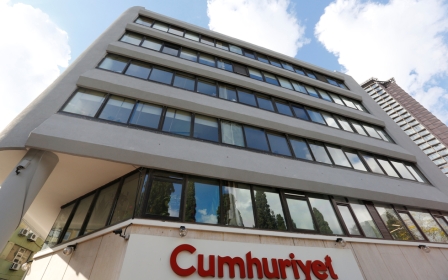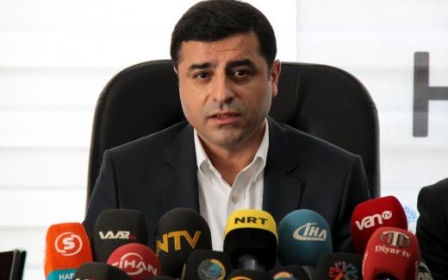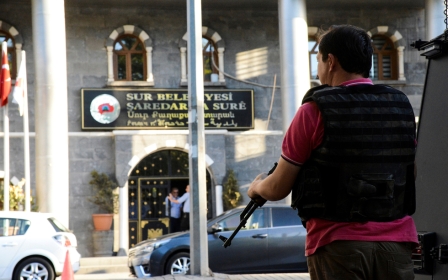Turkish journalists vow to resist 'attack on free press' after newspaper raid
ISTANBUL - Turkey faces losing the last vestiges of a free press following the raid on the opposition Cumhuriyet newspaper and arrest of senior staff, according to critics who reject the government claims that the raids were aimed not at journalism, but terrorism.
Cumhuriyet staff remain defiant and vow to continue to be an independent voice after the arrest on Monday of at least 11 staff, including chief editor Murat Sabuncu and columnist Guray Oz.
But commentators and politicians have told Middle East Eye they are concerned the latest arrests are an attempt to silence the staunchly secular and leftist newspaper, and a blatant misuse of state of emergency powers by the ruling Justice and Development Party (AKP).
"We will publish tomorrow and will continue to publish despite all attempts to silence us," Ayse Yildirim, who has worked in various positions at Cumhuriyet for more than two decades, told MEE.
"There are only three free newspapers left in Turkey along with one or two television stations. We are in no position to be scared anymore," said Yildirim.
The prosecutor’s office issued warrants under Turkey's penal code to raid Cumhuriyet and arrest 15 of its staff, including its cartoonist. The paper and its staff are accused of aiding and abetting the Fethullah Gulen movement and the Kurdistan Workers’ Party (PKK).
The office's statement claimed irregularities in the vote held in 2013 by the paper’s executive board to elect members to the Cumhuriyet Foundation, which owns the paper.
It also claimed to have evidence that the paper published articles legitimising the 15 July coup attempt against President Recep Tayyip Erdogan, a few days before it happened. The state blames the Turkish preacher Gulen and his followers for the coup attempt.
While Turkey's criminal law was used to execute the Cumhuriyet warrants, many others against media outlets and opposition groups have been issued through emegency powers enacted after the coup attempt - powers which AKP officials said would be used to target coup plotters and Gulen’s followers nestled within state structures.
Officials said they did not make any distinction between the Gulen movement and the PKK because they were both terrorist in nature.
'Terrorism, not journalism'
Deputy Prime Minister Numan Kurtulmus said on Monday it was wrong to call the Cumhuriyet raid an operation "against writers".
"This is about the entity that owns the Cumhuriyet newspaper. It is an investigation that was launched by the Istanbul chief prosecutor's office in August and then yesterday warrants were issued.
"It is a legal process and it is not right for the government to comment on it."
Oznur Calik, the deputy chairwoman of AKP, said no one arrested at Cumhuriyet was "being held for being journalists. We can’t condone anyone engaged in terror activities".
Cengiz Er, the editor-in-chief of the pro-government Superhaber news website, told MEE that the Cumhuriyet newspaper had strayed from its journalistic mission and the raid was a consequence of that.
"This can't be laid at the government’s door. There has been infighting within Cumhuriyet itself that the paper has strayed from its founding principles and from journalism," he said.
"Take Can Dundar for example. He is a project and has nothing to do with journalism. Others within the paper knew this and were opposed to him."
Dundar was editor-in-chief when he was arrested in 2015 for publishing video footage that showed Turkey’s spies apparently attempting to smuggle arms to Syria disguised as aid. At the time Erdogan had vowed that Dundar "would pay the price" for that "betrayal".
Er said polarisation in Turkey was pushing people to take positions without considering realities.
"I hate to see police enter a newspaper’s premises. It is a sad sight. But you can’t blame the government for this. It is not journalism when they have made it their mission to stop Recep Tayyip Erdogan at any cost. I know that they have often ignored PKK-related news just to damage Erdogan," he said.
Counter-coup claims
However, Kemal Kilicdaroglu, the chairman of the opposition Republican People’s Party (CHP), said the powers had been used in a "counter-coup" against anyone who opposed the ruling AKP party.
"The coup attempt of 15 July has been exploited. We have a situation where intellectuals and the free press are being silenced. We are now faced with a counter-coup," he said.
"They have used the state of emergency to bypass parliament and [are] using the power of decrees to change the constitutional order," Kilicdaroglu told reporters in front of Cumhuriyet’s Ankara bureau.
Even the Nationalist Movement Party (MHP), a firm ally of the AKP currently, opposed the raid on Cumhuriyet and arrest of its staff.
"To detain people who we know have fought against FETO [an abbreviation for Fethullah Terror Organisation, the name given to Gulen’s movement by the state] for years as part of the FETO investigation is nothing more than diluting the investigation," Ismail Ok, a MHP MP was reported as saying at a press conference in parliament.
More than 100,000 people have already been dismissed or suspended and 37,000 arrested since the failed coup, in an unprecedented crackdown that Erdogan says is crucial to wipe out Gulen supporters from the state apparatus.
Raids on newspaper offices and journalists being dragged out by police has become a common sight in Turkey in recent years.
According to Reporters Without Borders, Turkey's press freedom has shrunk dramatically over the last few years. Turkey fell from 102 out of 167 countries in 2008 to 149 out of 179 countries last year in its annual press freedom index.
Cumhuriyet has been in the AKP’s sights for years due to its vociferous criticism of AKP policies and its offices have been raided before.
More than 160 media outlets have been shut down since the state of emergency was declared. Apart from Gulen-linked media, most have been media outlets focused on Kurdish issues in the southeast of the country.
Expanded powers
Critics said the AKP is using the expanded powers granted by the state of emergency to target all its political opponents and stifle even the slightest dissent against its policies.
Yildirim said AKP hated Cumhuriyet and would resort to any excuse to target the paper even if the accusations were a complete paradox.
As recently as five years ago Cumhuriyet and some of the paper’s staff were accused of being part of "Ergenekon", an alleged plot by a secretive secularist ultranationalist organisation seeking to topple the AKP government.
The Gulen movement was at the forefront of targeting alleged Ergenekon members. Now the Cumhuriyet newspaper is being accused of aiding and abetting that very same Gulen movement.
Cumhuriyet's Yildirim said the AKP hated the paper because it exposed its corruption.
"We know the pressure on us will continue to grow because they cannot stand opposition to their authoritarian rule anymore," she said.
"We have always been targeted by those in power. Ours is among a handful of free and independent voices left. I dare not think of what the country will become if we allow those to be silenced as well."
Middle East Eye propose une couverture et une analyse indépendantes et incomparables du Moyen-Orient, de l’Afrique du Nord et d’autres régions du monde. Pour en savoir plus sur la reprise de ce contenu et les frais qui s’appliquent, veuillez remplir ce formulaire [en anglais]. Pour en savoir plus sur MEE, cliquez ici [en anglais].




